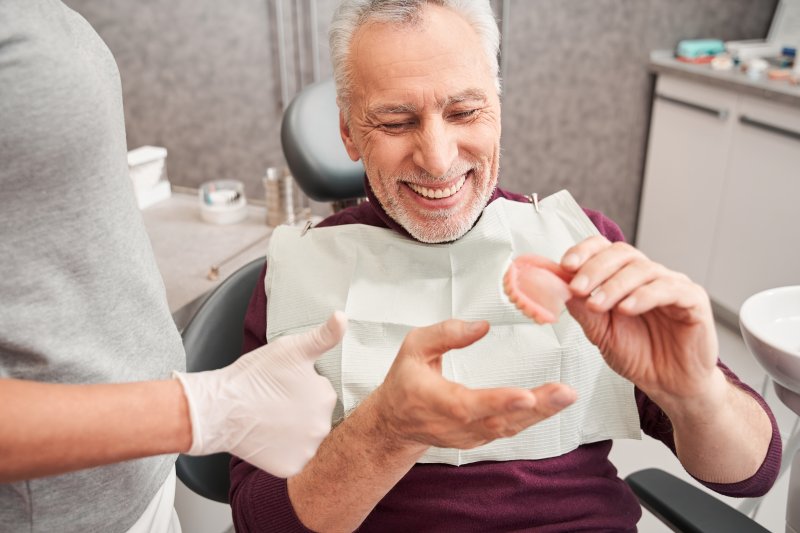
Getting dentures restores more than your missing teeth – it restores your confidence! It’s great that you’ve taken the steps to complete your smile and raise your quality of life. While you should celebrate, you’re not quite home-free yet! The first month after getting dentures is often an adjustment period, but soon you’ll be used to wearing your dentures and back to smiling, talking, and eating as you had before. Here’s what to expect in your first month with dentures.
The First 24 Hours After Getting Dentures
Your dentures act as a band-aid on the first day. Although in the future you should not wear them 24/7, you should have them on all day (even to bed) on the first day. This is so your gums have a chance to heal.
The First 2 Weeks
From the first 24 hours to the end of the first 2 weeks, you may need to visit your dentist several times for adjustments. This is to ensure they fit comfortably as your gums heal.
After the first 24 hours, begin removing your dentures every night before bed and putting them back on in the morning so your gums can rest.
It’s normal to feel a little sore or have increased saliva production in the first couple of days of wearing dentures. However, if this persists or worsens, see your dentist as soon as possible.
Stick to eating softer foods during the first two weeks. You can supplement your meals with protein-rich drinks until any soreness dissipates.
The 2 Weeks After
During the next two weeks, you should notice fewer sore spots and less saliva. Your gums, cheeks, and tongue will be more adjusted to wearing dentures.
Talking and eating with dentures may still require some practice. The more you do, the easier they’ll get.
If you’re still experiencing significant discomfort, contact your dentist about adjusting your dentures. Making an appointment sooner than later can manage a problem before it becomes serious.
30 Days After
Once a month has passed since you began wearing your dentures, it should feel like second nature. Even so, you may need to make an appointment to adjust the fit of your dentures if they are making you feel uncomfortable.
During this time, you should eat softer foods and make sure you are chewing evenly around your entire mouth so that each tooth adjusts uniformly. When you’re ready for tougher foods, cutting them into small, bite-sized pieces can prevent dislodging.
It’s best to avoid chewing food with your front teeth regardless of its toughness. As a general rule, even after 30 days, avoid foods that are too sticky or hard to protect your prosthetics and remaining natural teeth.
Practice good oral hygiene and clean your dentures regularly. Soak your dentures overnight so they don’t dry out.
Even after the adjustment period of wearing dentures, you should continue to take care of them to preserve their condition for as long as possible. With best practices like these, your smile will look and feel great for many years to come!
About the Practice
Drs. Amanda Cobb and Dan Mazor of Cosmetic & Restorative Dentistry of the Keys lead a highly trained dental team to preserve and protect patient oral health. The practice offers customized, life-like dental restorations. Whether you are looking for full, partial, or implant-retained dentures, the team is ready to give you back your signature smile. If you want to know more about denture aftercare, contact Drs. Cobb and Mazor at their website or by phone at (305) 680-1553.
